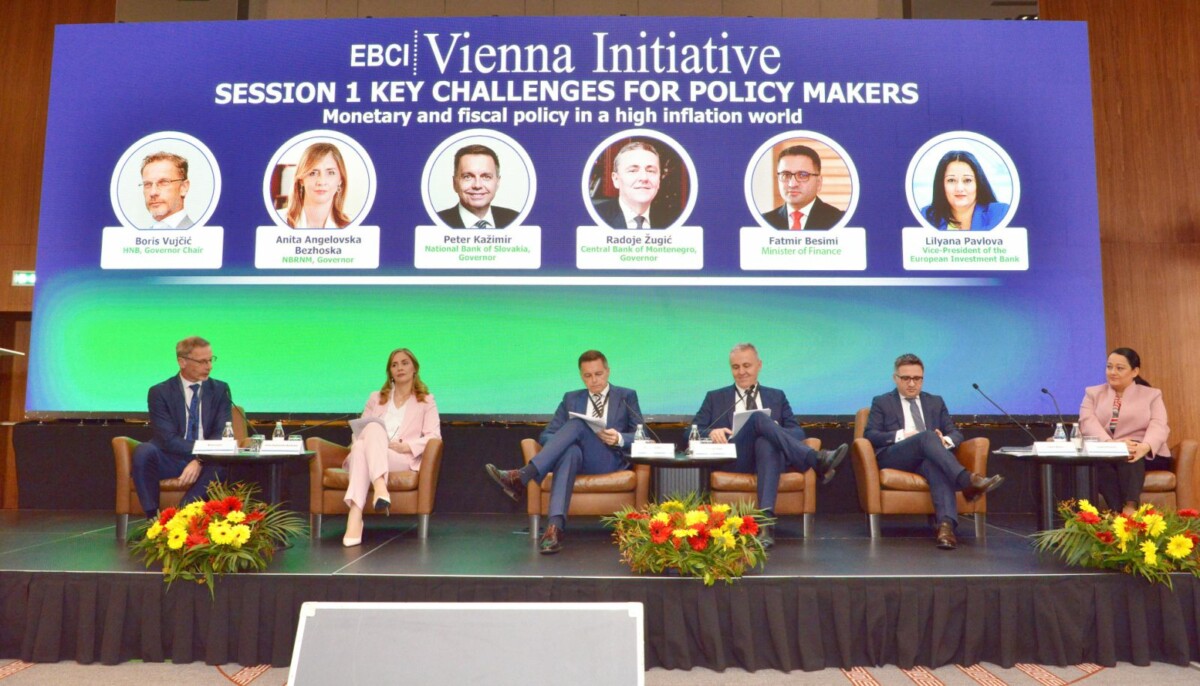Vienna initiative in Skopje: Inflation is slowing down, but it is too early to declare victory, we need careful policies
"Our new reality is - uncertainty is today's certainty", was said several times at a panel discussion where it was emphasized that there must be cooperation between central banks, and at the national level coordination of monetary and fiscal policy. Criticisms have been directed at wage growth without corresponding new added value
All countries with an open economy, such as North Macedonia, which is one of the most open in Europe, have a slow recovery. Inflation is slowing, but it is too early to declare victory. Cooperation and coordination of central banks is crucial in times of crisis, and monetary policy must correspond with fiscal policy. Our new reality is "uncertainty is today's certainty."
These are the main points from the panel discussion within the annual conference of the Vienna Initiative, which is being held today and tomorrow in Skopje, and which is hosted by the National Bank.
The Governor of the National Bank Anita Angelovska-Bejoska says that the openness of our economy is such that foreign trade is 140 percent to the gross domestic product.
The high dependence on food and energy particularly affects the most vulnerable categories of citizens. We are a very energy inefficient country. We consume three times more energy per unit of gross domestic product than the European Union. It is also important to improve the competitiveness of foreign markets. Government measures have a mixed focus, but are more aimed at vulnerable categories of citizens - said the governor.
She explained that in the future inflation in open countries like ours will predominantly depend on three factors. First, from global supply chains and that is beyond our control. Second, what cannot happen overnight, but which we are working on, is a change in the structure of the economy, and here we have positive movements in terms of investments in renewable energy sources. And third is maintaining a prudent macroeconomic mix.
Speaking about the necessity of connecting the monetary and fiscal policy, Angelovska-Bežoska said that "the growth of wages should be prevented without it being connected to the growth of productivity".
The participants of the panel agreed that in all countries, in order to amortize the growth of inflation, there is an increase in wages, but that it is unacceptable that this happens without creating new added value.
Regarding the growth of profit margins in times of crisis, Angelovska-Bejoska said that there are such sectors, but that things should not be generalized and that there will be an analysis on that issue yet.
The Minister of Finance Fatmir Besimi in whose hands is the fiscal policy, he said that compliance with the monetary policy is taken care of and that a significant part of the budget deficit is allocated to deal with the energy crisis.
We have faced numerous crises and they are our new normal. In 2020, the financial markets were available at a good price and this allowed us to cushion the crisis from the pandemic and mostly all countries increased public debt by 10 percent of GDP, and there were those that increased it by 20 percent. But no one could predict what will happen in Ukraine, and that brought new prices to the financial markets - Besimi said, emphasizing that in the next 5 years the set goals remain - the budget deficit to be up to 3 percent of GDP, and the public debt to 60 percent. , which is a big challenge.
The vice-president of the European Investment Bank Liljana Pavlova said that sustainable investment spending will continue to be the key driver of growth in Europe, both from public and private entities.
We believe that sustainable infrastructure projects should not be delayed, as they enable activities in the chain that would not otherwise be possible. Therefore, investments must be concentrated on renewable energy sources, energy efficiency, innovations, digital and sustainable infrastructures, in accordance with the priorities of each country in which we work - emphasized Pavlova.
At the panel discussion, it was also said that there is growth in real estate in all countries. Slovakia was mentioned as a special example, where there is the biggest increase in prices. Slovakia is also the second country in the EU in terms of property owners.
Households in Slovakia have doubled their borrowing in the last decade, and in that we are champions in the EU - said the governor of the National Bank of Slovakia, Peter Kazimierz.
He pointed out that they had a steep rise in mortgage rates, and that households coped with that, but that they fixed the interest rate.
The Governor of the Central Bank of Montenegro, Žugić, referred to the recent wage increases in this country, stressing that they were not accompanied by productivity growth.
Wages raised the level of demand, not only for products and services, but also for credits, and it can also be said that they increased the tax base in the short term. However, in the medium term, this will turn into a big fiscal problem because the budget deficit will increase, and the costs of financing it will also increase - said Žugić.
The Vienna initiative provides a platform for decision-making and coordination in order to prevent systemic banking risks, as well as conditions for uninterrupted credit flows in the economies of the region.



